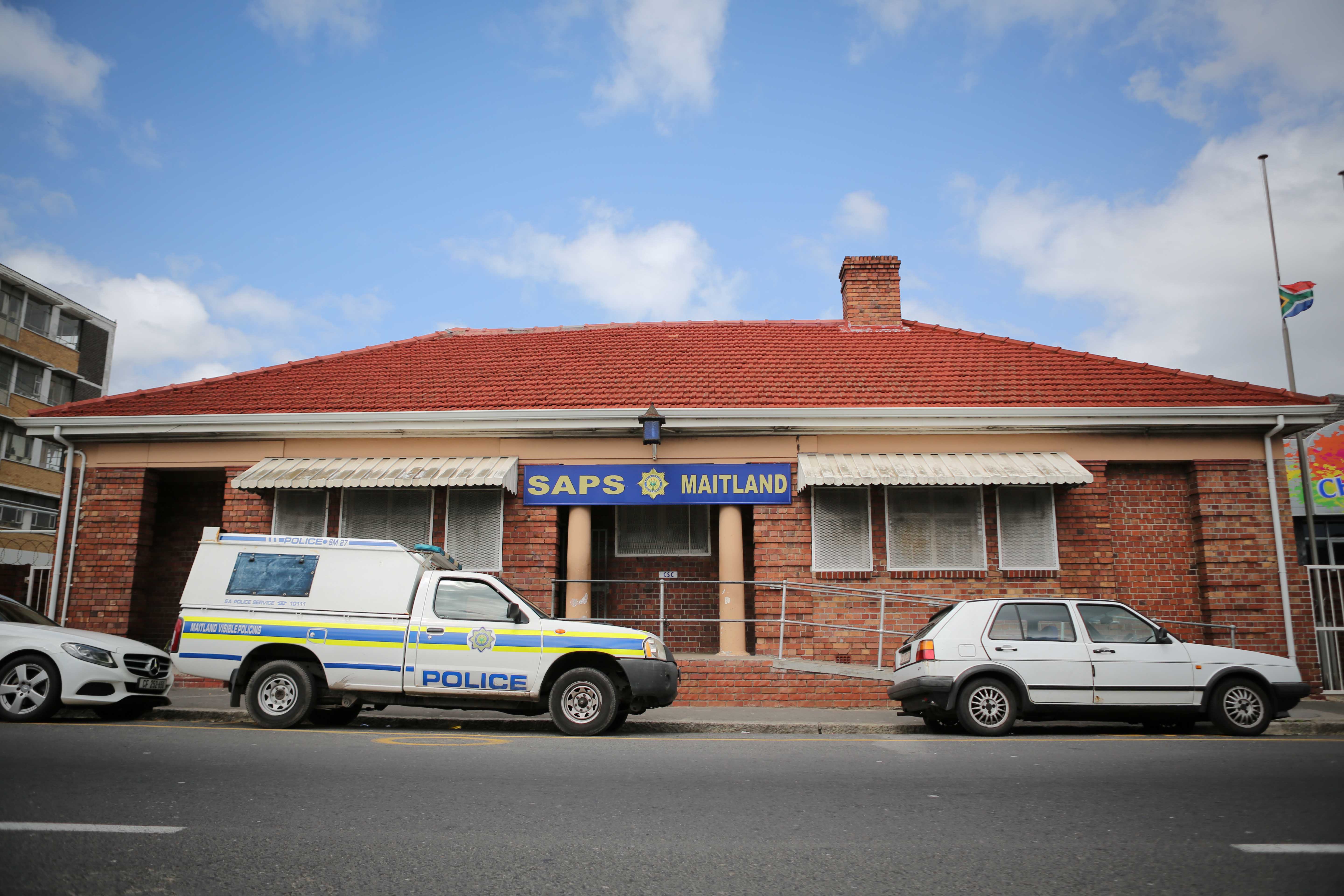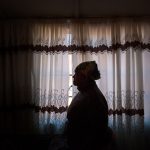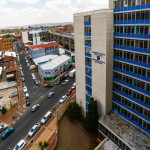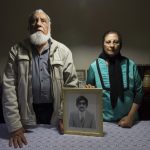Bid for slain Imam Haron’s family to see justice
Fifty years ago, anti-apartheid activist Imam Abdullah Haron was killed in police custody. His family fought to survive after his death, and now they are demanding justice.
Author:
23 September 2019

Galiema Haron once stood straight and tall. But as she grew older, her back began to curve as she stooped over her walking stick. More years passed and her back lowered still, as her frail hands tightly gripped her walker. Now, at 93, she can no longer walk. Her body has endured a lifetime of tragedy and triumph. As she lies in bed each day, there is one mystery she may never see solved: the truth of what happened when her husband, Imam Abdullah Haron, was killed.
Fifty years ago, on 27 September 1969, the streets around Galiema’s former home swelled with more than 30 000 mourners. The slender woman and her children, Shamela, Muhammad and Fatiema, had lost the one person who mattered most to them. The growing group of mourners walked with the family to Mowbray cemetery, where the Imam was buried. His funeral was one of the biggest in the Cape; there is a legend that elevated his death to supernatural status. On the day he died, as older generations tell it, there was an earthquake that made Cape Town quiver.

Earlier that day, two Security Branch officers had told Galiema that her husband, an anti-apartheid activist, had died in police custody on 27 September at the Maitland police station.
When Muhammad who was 13 years old at the time, saw his father’s body before the burial, his young eyes scanned the blood and bruises on the body.
Fatiema Haron-Masoet, who was then six years old, stood by her mother’s side, confused. Their older daughter, Shamela, was told to stay in London for fear that if she returned to South Africa, she would be arrested on suspicion of anti-apartheid activity. The instruction was one of Galiema’s first acts as the sole protector of her family.
The Imam’s story has been buried in the mysteries of apartheid and his family says he has not been given just recognition for his bravery as a freedom fighter. Now, they are going back to the places that hold his memory to cement his legacy in South Africa’s heritage.

The family left behind
Today, Haron-Masoet pays attention to her mother’s every need. Galiema can barely move her limbs without her daughter’s assistance. Her tongue has swelled and she can no longer speak. But she can turn her head to point at what she needs and makes gentle sounds. She can also still smile.
On a Monday morning in mid-August, she lies in bed listening as her daughter tells her about the sunny day outside. Haron-Masoet, who is now 56, feels the toll of her mother’s reliance. But she is devoted to spending her days caring for her mother. She remembers Galiema’s devotion to the survival of her children after the death of their father.
“I do it because she never abandoned me. She sacrificed everything for the sake of her children,” Haron-Masoet says.
Galiema’s husband was the Imam at Al Jaamia mosque in Claremont. He was appointed to that role when he was just 30 years old, the youngest ever in his time.

An Imam for social justice
He broke the rules. His flair for fashion and swanky suits drew glowering stares from elders, and his open disobedience against the apartheid regime was bold in a moment when some in his community were quiet. Many Muslim leaders, including those in the Muslim Judicial Council, were silent about apartheid because it did not interfere with the religious rites of fasting and prayer, but the Imam spoke out.
In his sermons from the mimbar of the mosque, he roused the youth to organise. He helped found the Claremont Muslim Youth Association (CMYA), where impassioned youngsters inspired his activism. The CMYA was significant in the imam’s understanding of the injustice of apartheid. He listened to the youth, because he believed in the power of future generations.
Imam Haron held a job at British sweet manufacturer Rowntree-Wilson, which gave him a reason to regularly visit townships in Langa, Gugulethu and Nyanga, where he became fondly known as mfundisi (priest). In sport, he was the first Imam to organise non-racialised sport events, and in the media he became prominent as the founder of the Cape Town-based community newspaper, Muslim News (now known as Muslim Views) where he served as editor. It was the first Muslim community newspaper in South Africa.
Related article:
Somewhere in all these activities, the Security Branch came to hear of him. He was summoned to their headquarters at the Caledon Square police station on 28 May 1969.
That evening, they brought him home briefly, while they ransacked his house. His wife looked on, distraught, while Haron-Masoet stood still.
“Moenie worry nie. Alles gaan okay wees (Don’t worry. Everything will be okay],” were the last words she remembers her father saying to her mother.
The next time they saw the imam was the day his body was returned home, four months later.

A widow, punished
In the aftermath of the imam’s death, the state said that the Islamic marriage between Galiema and her husband was not recognised in law and that the widow would not be entitled to inherit his estate. The house in Rylands, which was playfully called Golden Eye in honour of the Imam’s love of James Bond films, was sold.
At the time, Galiema said she was forced to sell the house because the maintenance costs were too high. But in reality, she feared telling the truth about the pressure she suffered from the state and she had almost no support from anyone close to her.
In a newspaper interview in 1971, Galiema shared her pain publicly. She had been forced to drop a lawsuit against the ministers of police and justice for her husband’s death because his father’s health had deteriorated. She was suing the two ministers for R22 000 in damages.
“Although the Imam was a prominent man in the Moslem [sic] community and did much for his people, very few came forward to assist,” Galiema told the journalist.
Related article:
With three children relying on her, Galiema moved into a room in her mother’s house. She was a gifted dressmaker and sewed furiously to make ends meet. Haron-Masoet remembers her mother’s intricate dresses travelling all the way to the Carnival festival in Rio de Janeiro, Brazil, in South America. At the time, she held a job with a tailor where she worked as a dressmaker. She worked Monday to Sunday, rising just before sunrise to begin the day. By night, she sewed to earn money on the side.
With thrifty spending, Galiema saved enough to build her family a new home. She started by buying each brick and slab of cement and delivering it to workers who made the home rise out of nothing. To this day, she still lives in that house with her daughter.
“All of my life, since the day I was born, I’m still living with my mom. Can you imagine that? We’ve never been apart,” Haron-Masoet says. “She built this house bond-free out of her pocket just with the sewing.”
The mosque where the Imam taught and preached is still active in Claremont. Many of his mentees and supporters have since joined the Claremont Main Road mosque, where Galiema’s father used to pray. The mosque’s Imam Rashied Omar was deeply influenced by Imam Haron. Young people are very much a part of the mosque’s activities and have been invited to give talks before the Friday sermon, a notable honour.
It is at this mosque that Imam Haron’s teachings live on most of all. But across the Cape, his influence is alive. During the month of Ramadan, some mosques call on youngsters who are learning to memorise the Qu’ran to lead parts of the holy month’s evening prayer. It was Imam Haron who popularised the inclusion of young people to lead the salaah. The Imam Abdullah Education Trust, a public benefit organisation, was established to empower impoverished youngsters through education.

Heritage status
In May 2019, the foundation began a nomination process for the Al Jammia mosque and the imam’s grave to be declared provincial heritage sites. Heritage Western Cape appointed Vidamemoria Heritage Consultants to prepare the nomination documents for the application. Cassiem Khan, the foundation’s coordinator, says this legacy has not yet been fully acknowledged.
“Unless this is done, it can’t just be left to fading memory. These will become markers of history that we can link to,” he says.
On 9 September, Heritage Western Cape declared that the grave site and Al Jaamia mosque are now protected heritage sites.
Related article:
After Imam Haron’s death, an inquest found that he had died as a result of injuries sustained after he fell down stairs. His family knew it was a lie.
The Imam fasted every single day of the 123 days of his detention, to remain conscious of God. Galiema would go to the police station with soup for him to break his fast in the evenings and sugary treats to satiate his sweet tooth. But a few days before her husband’s death, the police told her she could no longer see him.
Notorious Security Branch officers Spyker van Wyk and Dirk Genis led Haron’s detention and the brutal interrogation he faced inside prison. After the Imam was killed, an autopsy report revealed that there were 27 bruises on his body. He suffered internal bleeding at the base of his spine and his seventh rib was broken.

Forensic opinion
Percy Helman, a pathologist, told the 1970 inquest into the Imam’s death that he would have suffered much pain from his injuries and would have been unable to move. Helman, who attended an inspection of the stairs down which the imam was said to have fallen at the Maitland police station, said that all the bruises could not have been caused by the alleged fall.
The magistrate, JSP Kuhn, found that the alleged fall down the stairs was the primary source of what he found killed the Imam: a lack of blood flow to his heart meant oxygen could not get to the muscle. Helman said blood clotted in the Imam’s body as a result of his injuries. Kuhn could not account for all the Imam’s injuries in his findings, which were released in March 1970.
But the state has never admitted the truth about what happened. In 2019, the family decided to announce its decision to reopen the inquest into Imam Haron’s death. His son, Muhammad, said that they had previously considered requesting that the investigation be reopened, but that he held little faith in the state.
Related article:
For inquests to be reopened, the onus is on the families of apartheid victims to prove to the National Prosecuting Authority that there is evidence available to warrant a renewed inquest.
“We feel it is not for us to lick the state’s arse. It is for them to basically open up the inquest without us knocking on the doors. They want us to beg them first to basically do that,” Muhammad says.
Genis and Van Wyk have since died. The marks on the Imam’s body left little doubt that he had been tortured.
Before Galiema lost her ability to talk, she gave her blessing at the end of 2018 for the case to be reopened so that her family might finally find closure.

Closure
The families of struggle activists who have been killed and forcefully disappeared have banded together in a collective known as the Victims Support Group. They include the families of Ahmed Timol, Fort Calata, Hoosen Haffejee and Nokuthula Simelane among others.
Haron-Masoet is now representing her father’s sacrifice in this movement. Recognising his grave and the mosque where he taught is not just about the imam personally. His family and the Imam Haron Foundation feel it is a bold step toward commemorating all who were killed under the cruelty of apartheid.
Haron-Masoet’s only memories of her father live in her six-year-old mind. She never had the chance to know him. Today, people still contact Haron-Masoet to pay their respects to her father and share their memories.

“That is what amazes me,” she says. “Up until today I still hear different stories about my father from all over the world. These stories have an emotional impact. I’m still learning about my father.”
There are days when Galiema would like to die. Haron-Masoet knows it, the old woman feels her time has come. Haron-Masoet sees her mother, the once vociferous woman who worked relentlessly for her family, frustrated by her body’s near paralysis in old age.
At one time, after the imam’s death, Galiema could have lived in Europe or Canada. There were families who were willing to support her. But she stayed in South Africa and in doing so, protected her husband’s legacy and kept her children closer to him.
“I will never be able to overcome his death but I have to accept it. Even today, I’m sure goodness still comes out of his memory,” says Haron-Masoet.





